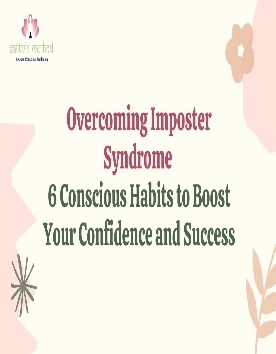Overcoming Imposter Syndrome: 6 Conscious Habits to Boost Your Confidence and Success
Do you often feel like fraud, doubting your achievements and attributing your success to luck? You’re not alone. Imposter syndrome affects countless individuals, making it difficult to embrace our true capabilities. It lurks in the background, casting shadows over our accomplishments and silencing our inner voices of confidence. But what if you could change that narrative? In this article, we’ll explore seven conscious habits that can empower you to break free from those debilitating feelings and embrace your true worth. By cultivating these transformative practices, you’ll not only boost your confidence but also pave the way for greater success in both your personal and professional life. Say goodbye to self-doubt and hello to a more authentic version of yourself. Let’s take the first step toward overcoming imposter syndrome together!
Understanding Imposter Syndrome
Imposter syndrome, a psychological pattern where individuals doubt their accomplishments and have a persistent fear of being exposed as a “fraud,” can be a formidable barrier to personal and professional growth. It is more common than many realize, affecting people across various demographics and industries. Despite being high achievers, those experiencing imposter syndrome often attribute their success to external factors such as luck or timing, rather than their own abilities. This mindset can create a vicious cycle of self-doubt and anxiety, preventing individuals from fully embracing their potential and achievements.
The roots of imposter syndrome can be traced back to several sources, including upbringing, personality traits, and societal pressures. For instance, individuals who were frequently compared to others or had their successes downplayed during childhood may develop a heightened sense of inadequacy. Similarly, perfectionists and those with high standards may struggle more with imposter syndrome, as they often set unrealistic expectations for themselves. Additionally, the pressure to conform to societal norms and the fear of deviating from them can exacerbate feelings of self-doubt.
Understanding imposter syndrome is the first step towards overcoming it. By recognizing that these feelings are widespread and not a true reflection of one’s capabilities, individuals can begin to dismantle the false narratives they’ve internalized. It’s important to acknowledge that imposter syndrome is not a sign of weakness or incompetence, but rather a common psychological experience that can be managed with conscious effort and the right strategies.
The Impact of Imposter Syndrome on Personal and Professional Life
Imposter syndrome can have far-reaching effects on both personal and professional aspects of life. In the workplace, it can hinder career progression by causing individuals to shy away from opportunities for advancement. They may avoid taking on challenging projects, speaking up in meetings, or pursuing promotions, all out of fear of being “found out.” This self-imposed limitation can result in missed opportunities and a lack of career satisfaction, as individuals may remain stuck in roles that do not fully utilize their skills and talents.
On a personal level, imposter syndrome can lead to chronic stress and anxiety. The constant fear of being exposed asa fraud can create a sense of unease and insecurity, affecting overall well-being. It can also strain relationships, as individuals may struggle to accept compliments or praise, feeling unworthy of such recognition. This can lead to a cycle of seeking external validation while simultaneously doubting its authenticity, which can be emotionally exhausting.
Moreover, imposter syndrome can stifle creativity and innovation. When individuals are preoccupied with self-doubt, they are less likely to take risks or think outside the box. This can limit their ability to contribute new ideas and solutions, both in professional settings and in their personal lives. By understanding the impact of imposter syndrome, individuals can better appreciate the necessity of addressing it and adopting strategies to build confidence and resilience.
Recognizing the Signs of Imposter Syndrome
Recognizing the signs of imposter syndrome is crucial for taking proactive steps to address it. One common sign is the tendency to downplay achievements. Individuals with imposter syndrome often attribute their successes to luck, timing, or other external factors, rather than acknowledging their hard work and abilities. They may believe that they have somehow “tricked” others into thinking they are more competent than they actually are.
Another sign is the fear of failure and the associated perfectionism. People with imposter syndrome often set impossibly high standards for themselves and feel immense pressure to meet them. This can lead to procrastination, as the fear of not meeting these standards can be paralyzing. They may also experience intense anxiety at the thought of making mistakes, as they believe any error will expose their perceived inadequacies.
Additionally, those with imposter syndrome may experience a persistent sense of self-doubt, even in the face of evidence to the contrary. They may constantly compare themselves to others, feeling that they fall short in comparison. This can create a cycle of self-criticism and negative self-talk, further entrenching feelings of inadequacy. By identifying these signs, individuals can become more aware of their thought patterns and begin to challenge the negative beliefs that fuel imposter syndrome.
Habit 1: Practicing Self-Compassion
Practicing self-compassion is a powerful habit for combating imposter syndrome. Self-compassion involves treating oneself with the same kindness and understanding that one would offer to a friend. It means acknowledging that everyone makes mistakes and experiences setbacks, and that these do not define one’s worth or abilities. By cultivating self-compassion, individuals can create a more supportive and nurturing inner dialogue.
One way to practice self-compassion is through mindfulness. Mindfulness involves being present in the moment and observing one’s thoughts and feelings without judgment. This can help individuals become more aware of their self-critical thoughts and recognize when they are being overly harsh on themselves. By observing these thoughts without judgment, individuals can begin to challenge and reframe them in a more compassionate way.
Another aspect of self-compassion is recognizing common humanity. This involves understanding that everyone experiences feelings of inadequacy and self-doubt at times. By recognizing that these feelings are a normal part of the human experience, individuals can feel less isolated in their struggles. This can foster a sense of connection and solidarity, reducing the power of imposter syndrome to undermine confidence.
Habit 2: Setting Realistic Goals
Setting realistic goals is another important habit for overcoming imposter syndrome. Unrealistic goals can set individuals up for failure and reinforce feelings of inadequacy. On the other hand, realistic and achievable goals can provide a sense of accomplishment and build confidence over time. By setting goals that are challenging yet attainable, individuals can create a positive feedback loop of success and self-efficacy.
One approach to setting realistic goals is to use the SMART criteria: Specific, Measurable, Achievable, Relevant, and Time-bound. This framework helps individuals break down larger goals into smaller, manageable steps. For example, instead of setting a vague goal like “I want to be more successful,” a SMART goal might be “I will complete a professional certification course within the next six months.” This specificity makes the goal more actionable and provides a clear path to success.
Another key aspect of setting realistic goals is to be flexible and adaptable. Life is unpredictable, and circumstances can change. Being willing to adjust goals as needed can help individuals maintain momentum and avoid becoming discouraged. It’s important to celebrate progress and recognize that setbacks are a natural part of the journey. By focusing on what can be achieved rather than what cannot, individuals can maintain a positive and proactive mindset.
Habit 3: Celebrating Small Wins
Celebrating small wins is a habit that can significantly boost confidence and counteract imposter syndrome. Often, individuals with imposter syndrome focus on what they have yet to achieve, rather than acknowledging and celebrating their accomplishments. By taking time to recognize and celebrate small wins, individuals can build a sense of progress and achievement, reinforcing their self-worth.
One way to celebrate small wins is to keep a success journal. This involves regularly writing down accomplishments, no matter how small, and reflecting on the effort and skills that contributed to these successes. Over time, this practice can create a tangible record of achievements, providing a powerful antidote to feelings of inadequacy. Reviewing this journal during moments of self-doubt can serve as a reminder of one’s capabilities and progress.
Another approach to celebrating small wins is to share them with others. This can involve sharing successes with friends, family, or colleagues, and allowing oneself to receive positive feedback and recognition. Celebrating with others can amplify the sense of accomplishment and create a supportive network that reinforces one’s achievements. It’s important to allow oneself to feel proud and to embrace the positive emotions associated with success.
Habit 4: Seeking Support and Mentorship
Seeking support and mentorship is a crucial habit for overcoming imposter syndrome. Having a support system can provide encouragement, perspective, and validation, helping individuals navigate feelings of self-doubt. Mentorship, in particular, can offer guidance, advice, and a model of success, helping individuals see their potential and capabilities more clearly.
One way to seek support is to build a network of trusted individuals who can offer encouragement and constructive feedback. This can include friends, family, colleagues, or professional networks. Sharing experiences and challenges with supportive individuals can create a sense of connection and reduce feelings of isolation. It’s important to choose individuals who are empathetic and understanding, and who can provide a balanced perspective.
Mentorship can also play a transformative role in overcoming imposter syndrome. A mentor can offer insights based on their own experiences, providing valuable guidance and support. Mentors can help individuals set realistic goals, celebrate achievements, and navigate challenges. They can also serve as role models, demonstrating that success is possible and that self-doubt is a common experience even among high achievers. Seeking out mentorship opportunities, whether through formal programs or informal relationships, can provide a powerful source of support and inspiration.
Habit 5: Embracing Continuous Learning
Embracing continuous learning is an effective habit for building confidence and combating imposter syndrome. Continuous learning involves a commitment to personal and professional growth, and a recognition that learning is a lifelong process. By adopting a growth mindset, individuals can view challenges and setbacks as opportunities for learning and development, rather than as evidence of inadequacy.
One way to embrace continuous learning is to seek out new experiences and opportunities for growth. This can involve taking on new projects, pursuing additional education or training, or exploring new interests and hobbies. By stepping outside of one’s comfort zone and embracing new challenges, individuals can build new skills and knowledge, reinforcing their sense of competence and capability.
Another aspect of continuous learning is to cultivate curiosity and a love of learning. This involves staying open to new ideas and perspectives, and seeking out opportunities to expand one’s knowledge and understanding. Reading, attending workshops and seminars, and engaging in discussions with others can all contribute to a growth-oriented mindset. By valuing learning for its own sake, individuals can reduce the pressure to be perfect and embrace the journey of growth and development.
Habit 6: Reframing Negative Thoughts
Reframing negative thoughts is a powerful habit for overcoming imposter syndrome. Negative thoughts can be pervasive and insidious, reinforcing feelings of self-doubt and inadequacy. By learning to identify and reframe these thoughts, individuals can challenge the negative narratives that fuel imposter syndrome and replace them with more positive and empowering beliefs.
One technique for reframing negative thoughts is cognitive restructuring. This involves identifying negative thought patterns, examining the evidence for and against these thoughts, and developing more balanced and realistic alternatives. For example, if an individual has the thought “I’m not good enough,” they can examine the evidence that supports this belief and consider alternative explanations, such as “I have accomplished many things and am capable of success.” By challenging negative thoughts and replacing them with more positive and realistic beliefs, individuals can reduce the power of imposter syndrome.
Another approach to reframing negative thoughts is to practice positive self-talk. This involves intentionally replacing negative and self-critical thoughts with positive and affirming statements. For example, instead of thinking “I can’t do this,” an individual might say “I am capable and can learn and grow through this challenge.” Positive self-talk can help to build confidence and resilience, reinforcing a more positive self-image.
It’s also helpful to practice gratitude and focus on strengths. By regularly reflecting on what one is grateful for and recognizing one’s strengths and achievements, individuals can shift their focus from what they perceive as lacking to what they have accomplished. This can create a more balanced and positive perspective, reducing the impact of imposter syndrome.
Conclusion: Taking Action Against Imposter Syndrome
Overcoming imposter syndrome is a journey that involves self-awareness, conscious effort, and the adoption of transformative habits. By understanding imposter syndrome and its impact, individuals can begin to challenge the negative beliefs and thought patterns that undermine their confidence. Practicing self-compassion, setting realistic goals, celebrating small wins, seeking support and mentorship, embracing continuous learning, and reframing negative thoughts are all powerful strategies for building confidence and resilience.
Join our Coaching Program Radiant Circle:
It’s important to remember that overcoming imposter syndrome is not about eliminating self-doubt entirely, but rather about learning to manage it in a way that does not hinder one’s growth and success. Everyone experiences self-doubt at times, and it is a normal part of the human experience. By adopting these conscious habits, individuals can create a more supportive and empowering inner dialogue, allowing them to embrace their true worth and potential.
Taking action against imposter syndrome requires commitment and persistence, but the rewards are well worth the effort. By cultivating these habits, individuals can build a more authentic and confident version of themselves, opening the door to greater success and fulfillment in both their personal and professional lives. It’s time to say goodbye to self-doubt and embrace the journey of growth and self-discovery. Together, we can take the first step towards overcoming imposter syndrome and unlocking our true potential.




